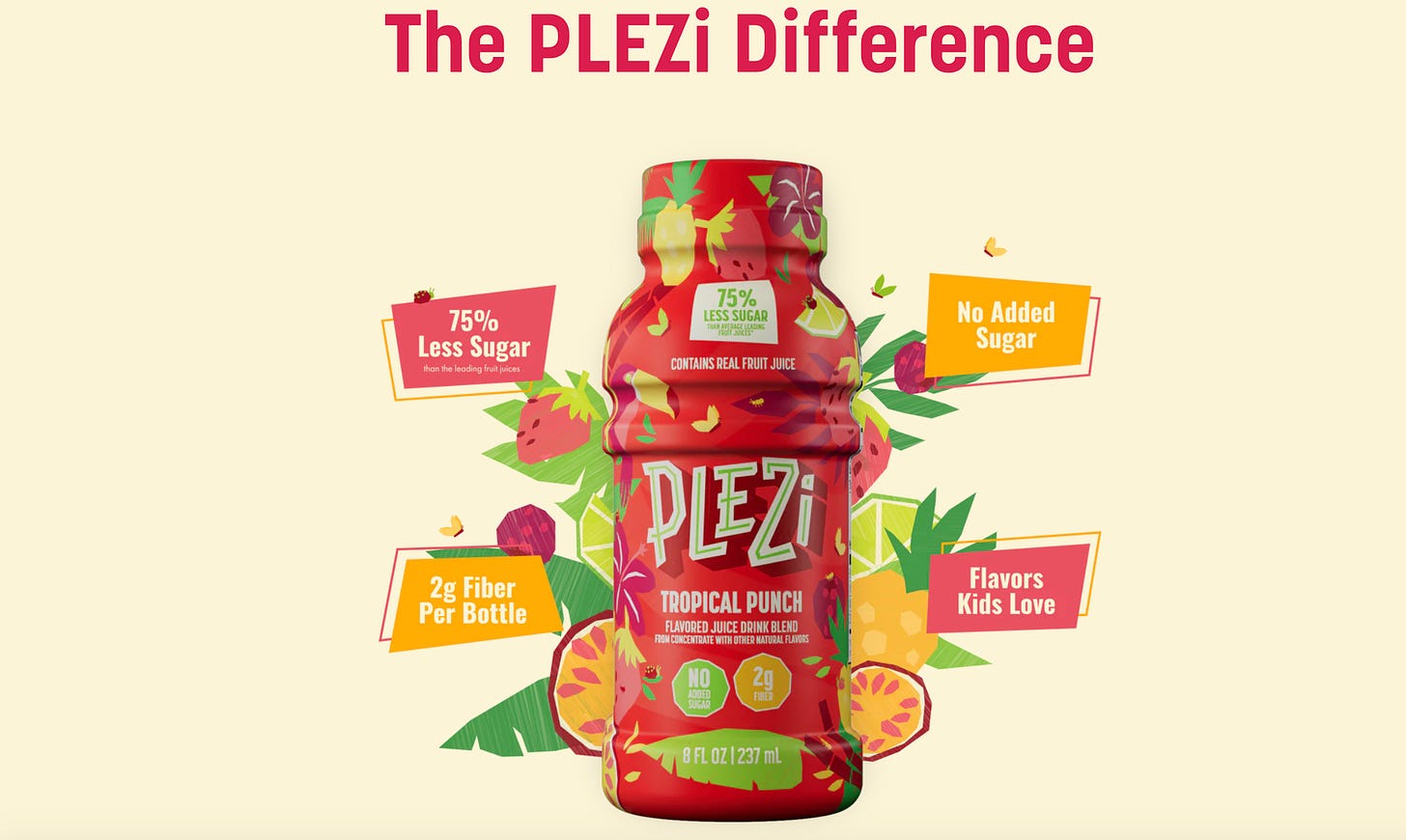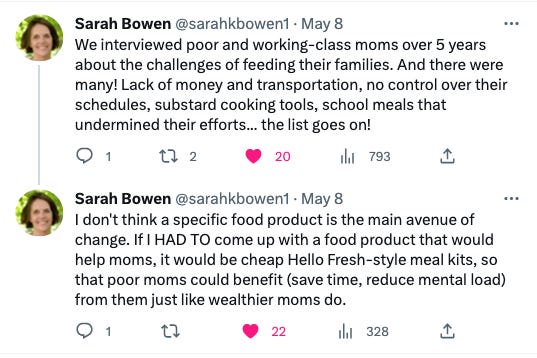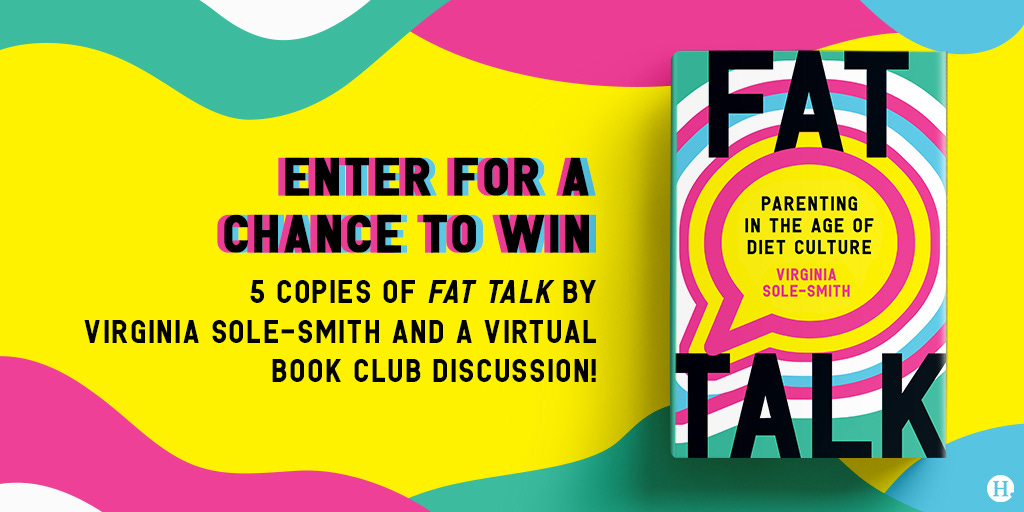Michelle Obama Is Not Coming To Save Us
Plezi isn’t great. And the backlash is maybe even worse?
In Chapter 1 of Fat Talk, I trace the long shadow of First Lady Michelle Obama’s Let’s Move campaign, which shaped our discourse about “healthy eating” and the “war on childhood ob*sity” in some good, and some very bad ways. But in the past few years, I’ve noticed that Michelle Obama has not actually been talking all that much about food or weight in public. I wondered if she’s had an evolution; if maybe her cool Gen Z daughters have educated her about anti-fat bias and she’d decided to quietly walk back from talking about weight. Because she has said a lot about voting rights. And girls’ education. And there have also been moments of what feel like true vulnerability in her public performance of herself: Talking about resenting her husband and her marriage during the first decade of raising kids. Sharing about her Covid depression. Knitting. All of this is the Michelle Obama that so many of us find very easy to love.
But there has also been a honing of her narrative as the ultimate #girlboss, leaning all the way in and empowering women (especially young women of color) to celebrate ourselves by being as excellent and successful as we can be. “I guess you might say that vigor is one of my Love Languages,” she writes in her most recent book, The Light We Carry, where she also talked about regularly scheduling “spa weekends” to bond with her best friends over punishing workouts and sugar/booze/meat-free meals. “I like who we become when we’re feeling a little pushed.”
And now, Michelle Obama is back to pushing her version of “healthy food,” with a new twist: She’s the co-founder of Plezi Nutrition, a public benefit corporation dedicated to “raising a healthier generation of kids.” Which they plan to do by selling things. First up is a fruit juice drink for kids age 6 and up, sweetened with stevia and monk fruit so it contains “75% less sugar than leading 100% fruit juices.”

The Plezi packaging is more reminiscent of Kool-Aid Jammers and Sunny D than Honest Kids or anything you’d find in Whole Foods, which makes sense because Obama wants her brand to compete with soda and sports drinks and appeal directly to kids, not just yoga moms. Obama unveiled Plezi at the Wall Street Journal’s Future Of Everything Festival in order to position the brand as cutting-edge, innovative, ground-breaking: Plezi, she promised, will “jumpstart a race to the top that will transform the entire food industry.”
Obama’s operating theory is that making Plezi super successful will make every other food brand scramble to match its supposedly-impeccable nutritional standards, thereby raising the bar on the quality of kids’ drinks and processed foods across the board. “No one has really cracked the code and been able to compete with the big beverage companies, and that’s exactly who we intend to compete with,” Sam Kass, the board chair of Plezi who is also the Obamas’ former private chef who spearheaded the launch of Let’s Move, told Food Fix. This conveniently ignores the existing market of lower sugar kids’ juice drinks, including the mega-popular brand Good2Grow, which makes the exact same “75 percent less sugar” claim as Plezi, and is already sold at over 100,000 US stores, including gas stations and Wal-Mart.
To say never mind about making systemic change through federal regulation, let’s just let the markets decide, is an oddly…Republican way of thinking about nutrition reform. Which is an interesting look for everyone’s favorite Democrat. In her launch speech, Obama explained:
While I remain very proud of what we did over those two terms, I’ve also realized the limits we had, even in the White House. I’ve learned that on this issue, if you want to change the game, you can’t just work from the outside, you’ve got to get inside – you’ve got to find ways to change the food and beverage industry itself.
But changing the food and beverage industry will only happen if consumers demand such change. And it’s straight-up diet culture to tell consumers that their children’s health crisis is a problem we can solve with…shopping. Putting the responsibility on parents to “make better choices” has long enabled Big Food to avoid regulation that would hold them to higher standards in the first place. It ensures that access to “healthy food”1 remains a function of privilege. Plezi retails for $4.99 for a four-pack; Marion Nestle reports that even on sale, it was almost twice as expensive as Capri Sun in her local Target. And of course, if this generation of kids doesn’t “get healthier,” companies, doctors, and every troll on the Internet can blame it on bad, lazy parents who feed their kids junk.
Let’s also be clear that there is diet culture and anti-fatness embedded into all of Obama’s references to “healthier kids.” While there is no explicit mention of childhood ob*sity on the Plezi website, it’s front and center in all of the brand’s media coverage, and played a major supporting role in Obama’s launch speech, albeit with some convoluted framing:
I winced when I saw the latest guidance for the medical community that came out a couple months ago – that in addition to eating healthier and being active, doctors are now being advised to consider medication and surgery for kids over 12 when lifestyle changes aren’t enough. If that’s not enough to convince us that we need to do more, then what is?
To Obama, the failure of the AAP guidelines isn’t their focus on kids’ losing weight, despite that strategy’s significant potential for harm. It’s that the guidelines jump to medication and surgery, when she wants to be able to fix kids’ bodies through diet and exercise alone. She sees the AAP guidance as evidence that childhood ob*sity is getting worse. I see it as yet another failure in the war on kids’ bodies that Obama helped launch.
We can see this failure too, in the way liberals are responding to Plezi because mostly, they are just mad because it’s juice. Nestle decried Plezi’s “five kinds of sweeteners,” and argued that it qualifies as an ultra-processed food. “It’s complicated to compete in the trash food space with something harm reducing but not healthy.” tweeted Garance Franke-Ruta. And by the way, it’s not just liberals. Hating juice plays well on both sides of the aisle.
Obama’s team clearly anticipated the juice backlash because the Plezi website is quick to agree “water will always be the best option for your kids,” and follows that up with helpful tips like “pack a water bottle if you’re headed out for an activity or errands.” The brand has also donated $1 million to FoodCorps’ Nourishing Futures initiative, which is working on universal free school meals and nutrition education by 2030. Which seems like where Obama probably should have started and ended this project.
As I’ve written before about our war on juice: This is a food anxiety with deep roots in anti-fat bias as well as racism and classism. Drinking your calories is only a concern if weight management is your goal. And as
explains:…Our judgments about drinking your calories [...] change based on who is doing the drinking, how much that drink cost, and who is selling it. Is it a $2 lemonade purchased at the corner store by a fat Black woman, or a $12 turmeric-beet juice purchased at a yoga studio by a thin white man?
Plezi is marketed somewhere between these two options, making it a critique of both, and a solid replacement for neither. It does not fulfill a true consumer need, because nobody needs another low-ish sugar juice drink to make feeding families easier or more doable. As Sarah Bowen, PhD, a professor of sociology at NC State University and co-aut\hor of Pressure Cooker put it in this tweet: “This is not what moms (or kids!) need!”
And nobody needs to be restricting their kids’ sugar or juice intake in the name of “healthy eating.” We know from all the research on kids, food and restriction that this won’t make kids like sugar less. It will make them more aware, through this brand positioning, of sugar and juice as foods to feel fraught about. Plezi plays right into the binge-restrict cycle that is American food and diet culture marketing, only mildly confusing the plot by presenting as a processed food that’s pro-restriction.
So Michelle Obama has not entered her body liberation era. Maybe that just doesn’t feel available to her, as someone who has lived for so long with her body under the siege of so much racism, misogyny, and anti-fatness. As I wrote in Chapter 1 of Fat Talk: “Obama’s job was to reject the mammy, the welfare queen, and every other derogatory stereotype about Black women, and thinness was a part of how she did that.” And maybe liking who you become when you’re “a little pushed” means you can never quite give yourself permission to just be. I want all of her hard work and stereotype rejection and pushing to mean things are easier for our kids though. And a brand that just makes everyone freak out, yet again, about juice, is not going to get us there.
Book Club Giveaway!
Are you reading FAT TALK with your book club? Enter our sweepstakes for a chance to win FIVE copies of the book plus one me Zooming into your discussion! You have until June 13. Oh and don’t forget to also download the Book Club Reading Guide!
You Asked: Can Thin People Post Bikini Pictures?
Q: I am a straight-sized 27 year old who does a lot of exercise. Being an athlete is a core part of my identity and I am proud of the fitness I have achieved and how my appearance reflects this. Is there a way that I can present my body to the world without perpetuating traditional ideas about thinness and athleticism? What are the ethics of posting a bikini pic, or of wearing yoga pants or crop tops? I recognize that there are athletes (many of whom are much better than I) who come in all shapes and sizes, and yet, because I am straight-sized I have the privilege of being recognized as more "legitimate," whatever that means.
Hopefully this doesn't come off as sounding too self-aggrandizing; that is not my intention. I am genuinely curious about what your thoughts are and how I can be a better ally to people of all body types.
About a year ago, I wrote an essay called No One Needs Your Workout Selfies. It’s deliberately framed as a polemic not because I want people to feel guilty for posting workout selfies, but because I want us to reflect on how workout selfies become automatically imbued with morality, whether we personally ascribe to health and fitness as virtues or not. So the short answer is: Skip the selfies and you remove a big chunk of risk of your perpetuating harmful body ideals. The better answer is, of course, much more complicated than that.






